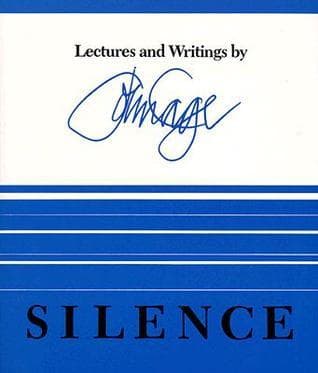
Book Review Summary: Silence: Lectures and Writings
Introduction
John Cage, the renowned composer of avant-garde music, has left an indelible mark on the world of music and art. His innovative approach to composition, which incorporates elements of chance and silence, has challenged conventional notions of music and expanded the boundaries of artistic expression. In his book "Silence: Lectures and Writings," Cage shares his thoughts on music, art, and the human experience, offering readers a unique perspective on the creative process.
About John Cage
John Cage was an American composer, philosopher, poet, music theorist, artist, printmaker, and amateur mycologist and mushroom collector. He was one of the leading figures of the post-war avant-garde, known for his groundbreaking contributions to music, dance, and art. Cage's music often defies conventional expectations and challenges the listener's perception of sound and silence. His influence on contemporary art and music is widely recognized, making him a significant figure in the 20th century.
Analysis of Views
-
Embracing Chance and Silence: Many readers appreciate Cage's embrace of chance and silence as essential elements of creativity. Cage's use of chance operations in his compositions and writings encourages a more open-minded approach to artistic expression, allowing for unexpected and unpredictable outcomes. His exploration of silence as a form of sound challenges the conventional notion of music as a continuous flow of notes and encourages listeners to appreciate the stillness and quietness that can exist within it.
-
Inspiring Freedom: Cage's ideas about freedom and creativity resonate with readers who value the ability to break free from conventional constraints. His emphasis on the importance of letting go of preconceived notions and embracing the unknown inspires readers to explore new possibilities and push the boundaries of their own creativity. Cage's approach to music and art encourages a sense of liberation, allowing individuals to express themselves in unique and unconventional ways.
-
Exploring Eastern Philosophy: Cage's incorporation of Eastern philosophies, particularly Zen Buddhism, into his work intrigues readers who are interested in cross-cultural explorations. His studies with Indian philosophy and Zen Buddhism influenced his understanding of music as a form of meditation and his belief in the importance of silence as a means of achieving inner peace. Cage's integration of Eastern philosophies into his artistic practice adds depth and complexity to his work, making it more meaningful for those who are interested in exploring these concepts.
-
Engaging with Language: Cage's use of language in his writings is another aspect that captivates readers. His ability to convey complex ideas through language challenges readers to rethink their own approach to writing and communication. Cage's innovative use of language, combined with his exploration of music and silence, creates a unique reading experience that pushes readers to reconsider their relationship with language and sound.
-
Challenging Conventional Music: Cage's challenge to conventional music structures and expectations resonates with readers who appreciate experimental and unconventional approaches to art. His rejection of harmony and tonality in favor of chance operations and silence pushes the boundaries of what is considered "music." This challenging perspective encourages readers to question their own assumptions about music and opens up new possibilities for creative expression.
Reasons for Recommendation
-
Innovative Approach: Cage's innovative approach to music, art, and language makes "Silence: Lectures and Writings" a compelling read. His willingness to embrace chance operations, silence, and Eastern philosophies adds depth and complexity to his work, making it stand out from conventional approaches to creativity.
-
Inspiring Freedom: Cage's emphasis on freedom and breaking free from conventional constraints resonates with readers who value creative expression without limitations. His ideas about embracing silence and letting go of preconceived notions encourages readers to explore new possibilities in their own creative pursuits.
-
Cross-Cultural Exploration: For readers interested in exploring Eastern philosophies and their influence on contemporary art, "Silence: Lectures and Writings" offers a unique perspective on how these concepts can be integrated into creative practice. Cage's incorporation of Zen Buddhism into his work adds depth to his ideas and provides a thought-provoking exploration of these concepts.
-
Engaging Writing Style: Cage's engaging writing style makes "Silence: Lectures and Writings" accessible to readers who may not have a background in music or art. His ability to convey complex ideas through language makes it easier for readers to understand his perspective on creativity and the role of chance in artistic expression.
-
Challenging Conventional Music: For those who appreciate experimental and unconventional approaches to music, "Silence: Lectures and Writings" offers a fresh perspective on what constitutes music. Cage's challenge to conventional harmony and tonality challenges readers to reconsider their own assumptions about music and opens up new possibilities for creative expression beyond traditional musical structures.
Reasons for Not Recommendation
-
Challenging Content: Some readers may find Cage's exploration of chance operations, silence, and Eastern philosophies challenging or difficult to grasp. The book requires a willingness to engage with unconventional ideas and may not be suitable for those who prefer more straightforward or conventional approaches to creativity.
-
Limited Musical Focus: While "Silence: Lectures and Writings" offers insights into Cage's philosophical approach to music, it may not provide enough information for readers interested in his specific compositions or musical techniques. Those seeking a more in-depth exploration of Cage's musical work may find this book lacking in that regard.
Conclusion
"Silence: Lectures and Writings" by John Cage offers a unique perspective on creativity, challenging conventional notions of music, art, and language. Through his exploration of chance operations, silence, Eastern philosophies, and freedom, Cage invites readers to reconsider their own approach to creative expression. While some readers may find the content challenging or require a background in music or art to fully appreciate it, others will appreciate the innovative ideas presented in this thought-provoking book. Whether you are a fan of avant-garde music or simply interested in exploring unconventional approaches to creativity, "Silence: Lectures and Writings" is a must-read for anyone seeking inspiration or seeking to expand their understanding of the creative process.